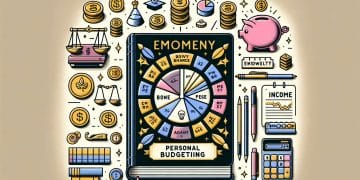Master Your Budget: Practical Tips for Achieving Financial Freedom


In the contemporary age of economic dynamism, achieving financial independence is a fundamental ambition. Managing finances effectively is a key element whether one is saving for future endeavors or merely steering daily expenses. Budgeting, often seen as a tedious task, provides a structured pathway to financial wellness. For many, it involves confronting potential pitfalls that may derail their monetary goals. This article will delve into practical strategies to enhance budgeting skills, steering towards financial liberation.
Anúncios
Budgeting is the backbone of sound financial management, offering a structure that guides the allocation of resources efficiently. Without a planned budget, it becomes challenging to monitor expenditures, potentially leading to unforeseen debt and stress. Understanding and harnessing budgeting techniques empowers individuals to align their spending with personal financial aspirations. This article illuminates the importance of such practices for financial growth.
Many misunderstand budgeting as restrictive, but in truth, it provides freedom. By taking control of expenses and income, one can navigate unforeseen financial challenges and prosper. An effective budget accommodates goals beyond mere financial survival, such as saving for significant purchases or crisis resilience. This guide will outline approaches to setting, maintaining, and adjusting budgets that foster your journey to financial empowerment and stability.
Understand Your Financial Landscape
The journey towards financial mastery starts with a comprehensive understanding of your financial landscape. This entails a meticulous examination of income streams, expenses, and outstanding debts. Begin by calculating the total monthly income from all possible sources, including salary, freelance projects, and investments. By clearly defining your financial inputs, you lay the foundation necessary for structured financial planning, promoting effective allocation of resources.
Once income is identified, tracking expenses becomes pivotal. Over a month, document every transaction to gain insights into spending habits. Employ applications or spreadsheets to categorize outgoings into essentials and non-essentials, unearthing potential savings areas. Many discover that minor adjustments culminate in considerable savings, spotlighting the first steps toward financial surplus—understanding where money goes is crucial for financial control.
Establishing clear goals ensures that budgeting moves beyond a mundane task to a purposeful pursuit. Articulate specific financial ambitions, whether retiring debts, preparing for a dream vacation, or securing funds for emergencies. Establishing SMART goals—Specific, Measurable, Achievable, Relevant, and Time-bound—turns aspirations into actionable plans. A mere desire to save transforms into a tangible target by setting out a timeline and quantifiable objective.
Tailor a Customized Budget Plan
- Base your plan on precise income, identified expenses, and financial objectives.
- Prioritize essential needs, allocating resources accordingly for necessities.
- Strategize funds distribution for savings and debts prior to discretionary spending.
A well-balanced strategy might align with methodologies like the 50/30/20 rule, dedicating specified income segments to needs, wants, and savings. This structured approach ensures that expenditure remains aligned with financial intentions, maximizing monetary potential and minimizing wastage.
Adopt Progressive Financial Practices
- Automate savings for consistent, hassle-free financial growth.
- Opt for cash over cards to enhance purchase mindfulness.
- Conduct monthly reviews to adjust budgets to life’s evolving circumstances.
Such practices encourage disciplined spending, moving beyond impulsive purchases to strategic financial decisions. Consistent habits reinforce financial discipline and adaptability, ensuring stability amid financial dynamics.
The Upside of Financial Literacy
Knowledge in personal finance equates to strategic empowerment. Familiarity with concepts like interest rates, diverse investment choices, and credit scoring promotes informed decision-making. This understanding enhances one’s ability to identify opportunities for improving financial health. Engaging in finance-focused learning through online resources or workshops elevates one’s financial acumen, fostering prudent resource management and potential wealth cultivation.
Leveraging sophisticated financial tools helps streamline money management. Utilizing apps like Mint or You Need A Budget (YNAB) provides insights into spending habits, helping to establish and adhere to financial goals. Online calculators facilitate planning for retirement or mortgage assessments, safeguarding decisions with comprehensive understanding.
Seek Professional Financial Guidance
In scenarios where monetary management proves complex or overwhelming, professional advice can be invaluable. Financial advisors offer personalized strategies, simplifying intricate financial products and facilitating long-term wealth building. Their insights save time and potentially foster significant financial benefits, ensuring well-rounded financial health and growth.
Mastering budgetary skills is an ongoing journey requiring dedication, learning, and periodic reassessment. By comprehending financial status, setting definite aims, and avoiding common budget errors, you carve a path towards financial independence. The future is full of secure and enriching possibilities—your financial transformation awaits your commitment today.





